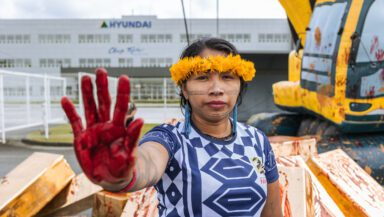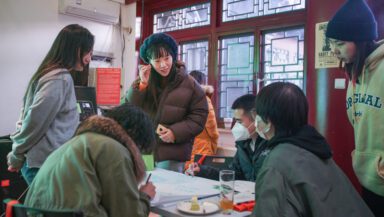There’s a Rang-tan in my classroom is launching on social media: https://bit.ly/2Bw6m2V
Images from film: https://bit.ly/2Rgnx2e
There’s a Rang-tan in our classroom, launches today: With many companies promising to stop buying palm oil from forest destroyers by 2020, a new Greenpeace film aims to remind them of their commitments. It features school children in London, Manchester and Cardiff sending a very different Christmas letter. The recital of “there’s a Rang-tan in my bedroom” adds the next generation’s voice to a widespread call for the end of rainforest destruction for palm oil.
Rang-tan has become a humble heroine in the battle against dirty palm oil for Greenpeace. Her story has become one of the most watched adverts of all time, with over 80m online views, leading to a massive upsurge in awareness of dirty palm oil production – encouraging Wilmar, which produces 40% of the world’s palm oil, to tighten checks on sustainable production from its suppliers. Work still remains to be done as companies around the world consume millions of tonnes of dirty palm oil each year, in products as diverse as shampoo and chocolate.
Rang-tan’s story prompted over 1,000 schools to contact Greenpeace for teaching aids on the issue, and thousands of children have been supporting Rang-tan with letters, stories and films of their own. This film brings together hundreds of children across the country in a unified and powerful voice, demanding companies deliver on their promises.
John Sauven, Executive Director of Greenpeace UK said: “Rang-tan has moved people across the world and brought the destruction of forests for dirty palm oil to the attention of millions. The number of schools wanting to get involved in helping to protect the rainforest has been heart-warming, we wanted to help those children have a louder voice.”
ENDS
Notes to editors
Schools taking part in the film are:
- Chisenhale Primary School, London
- St John’s C of E Primary School, London
- St Joseph’s R C Primary School, London
- Pentrebane Primary School, Cardiff
- Montessori School, Cardiff
- Thornhill Primary School, Cardiff
- Davyhulme Primary School, Trafford
- St Anthony’s R C Primary School, Manchester
“The lesson the children have had in being part of our video is one of the most important they’ve had this term. That you are never too young to take a stance and make a difference. That their opinions matter and that we will listen to them and enable them to act on them. I thought they would enjoy making the video and then move on. I was wrong. I underestimated them. They want to make a difference and we will ensure we do all we can to support them.” Esma Izzidien, Cardiff Montessori School
“Some of the world’s biggest companies are failing in their pledge to stop deforestation by 2020. We won’t let them forget! At Pentrebane Primary we are committed to working together to make a difference to our world. The past cannot be changed but the future is in our power and together we can make our future brighter.” Claire Janik, Pentrebane Primary, Cardiff
“The Rang-tan animation has been such a powerful teaching tool, that has really resonated with the children. They’re proud to be involved in raising awareness of the devastation caused by palm oil production.” Bethany Bayley, Thornhill Primary School, Cardiff
“Since watching the Rang-tan advert, my class have been inspired to do something to help the orangutans. They’ve realised that this is their planet and they are the future. Making learning real and relevant has had a huge impact on the quality of work children have produced. They’ve learnt that if they’re passionate and want the world to change, the internet gives them a platform to share and raise awareness and bring that change.” Lee Parkinson, Davyhulme Primary, Urmston
More information about palm oil
In 2010, Consumer Goods Forum companies pledged to protect forests and limit climate change, with a clear commitment to clean up global commodity supply chains by 2020. World governments, emboldened by this pledge and in the knowledge that stopping deforestation was the easiest and most cost-effective way to reduce greenhouse gas emissions, incorporated action to address forest destruction into the Paris Agreement as a key part of their strategy to mitigate global temperature rise. 2020 targets for halting deforestation and biodiversity loss and for restoring degraded forests also figure in the United Nations (UN) Sustainable Development Goals, to be implemented by ‘all countries and all stakeholders, acting in collaborative partnership’ in order to eliminate poverty and ‘to heal and secure our planet’.
But with less than 400 days to go until 2020, consumer brands, including those with ‘no deforestation, no peat, no exploitation’ (NDPE) policies, still use palm oil from producers that destroy rainforests, drain carbon-rich peatland and violate the human rights of workers and local communities – making their customers complicit in forest destruction, climate change and human rights abuses.
Greenpeace International investigated the 25 most notorious palm oil companies in Southeast Asia that supply brands from Unilever to Mars to Mondelez and set out the results in Final Countdown (https://bit.ly/2QM7m9P). These 25 companies had destroyed over 130,000 hectares of rainforest since 2015 – an area almost twice the size of Singapore.
Contacts:



